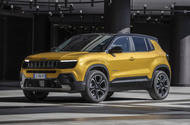The Jeep Avenger was designed and engineered in Europe
American brand now plans for a full range of electrified vehicles in the UK by 2025
The Jeep Avenger’s crowning as the 2023 Car of the Year must count as one of the industry’s most unlikely success stories.
Back in the autumn when it was revealed, the Avenger, designed, engineered and built in Europe, was billed as the Jeep that showed the famous US 4×4 brand was finally taking Europe seriously, and ready to make a lasting impression here.
Yet such comments we’d heard before when it unwrapped the likes of the Renegade and Compass, both compact SUVs in different segments more favourable (or not, as it turned out) with European buyers.
Which is why any proclamations of almost doubling sales for Jeep in Europe from its peak year of 168,652 in 2018 to 300,000 were met with a fair degree of scepticism.
Yet in the three months since, the Avenger has laid down a quite unexpected marker for Jeep’s future prospects. It is quite brilliant to drive, truly original in its size and positioning for an electric car, all of which means Jeep’s lofty European aspirations need no longer be viewed with any scepticism. The sky is now the limit.
“It is a huge compliment to the team of more than 1000 people, and a huge recognition to the product,” said Jeep’s European boss Antonella Bruno on the COTY success she has masterminded for the Avenger.
Bruno is candid, as was Jeep CEO Christian Meunier back in the autumn, of Jeep’s challenge in Europe. “We suffered without the right engines, and we’re seen as too aggressive and polluting,” she told me on the eve of the Avenger’s COTY win in Belgium.

The firm started to address this with plug-in hybrid versions of the Compass and Renegade, “the first phase of electrification that we already see results with the brand”, and now “Avenger adds another level and will accelerate the growth”.
“It’s the right car at the right time in the right markets,” she adds.
Jeep’s plan is now for a full range of electrified models in the UK by 2025, and to be fully electric by 2030 with full market coverage of all major SUV segments.
What is perhaps even more remarkable about Jeep in the UK is that it retains an incredibly strong brand image, despite not having launched any real high-quality models for a long while – an attribute that is not lost on Bruno – which means there is an obvious opportunity for the Avenger to capture the imagination of the market.
“The brand is incredibly well known,” Bruno says of Jeep in the UK, and thus “the UK customer is ready to accept our new products.” She believes it’s a car that can act as a real trailblazer for the brand ahead of more electrified models in the coming years.
The target for this new Jeep is not to take on premium brands like Land Rover or BMW, but rather more credibly the likes of Volkswagen and Mini. “We’re targeting the upper mainstream,” she says, when reminded of a short-lived plan which would have seen Jeep paired with Alfa Romeo to create an Italian-American Jaguar Land Rover rival.
Agency sales await Jeep but not before 2027. Bruno is not looking to overhaul the Jeep network, rather find the right “profile of investors with the commitment to invest in the brand”. She adds: “We’re not growing but will be present where we need to be.”
Jeep bosses were already feeling confident in autumn when they took us around the Avenger’s production site in Tychy, Poland. We were listening then, of course, but without anything credible to root such a plan in and really believe in it. Having seen how well-finished and how ‘right’ the Avenger is for Europe, Jeep now has our undivided attention, as the rest of the industry should.
Source: Autocar
